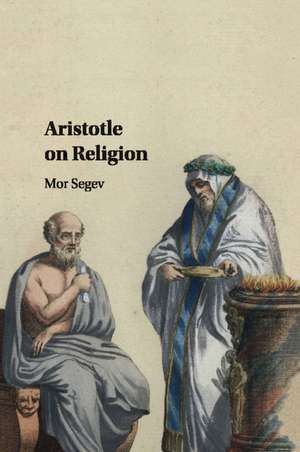Aristotle on Religion
Autor Mor Segeven Limba Engleză Paperback – 21 aug 2019
| Toate formatele și edițiile | Preț | Express |
|---|---|---|
| Paperback (1) | 280.35 lei 6-8 săpt. | |
| Cambridge University Press – 21 aug 2019 | 280.35 lei 6-8 săpt. | |
| Hardback (1) | 689.93 lei 6-8 săpt. | |
| Cambridge University Press – noi 2017 | 689.93 lei 6-8 săpt. |
Preț: 280.35 lei
Nou
Puncte Express: 421
Preț estimativ în valută:
53.65€ • 57.37$ • 44.73£
53.65€ • 57.37$ • 44.73£
Carte tipărită la comandă
Livrare economică 18 aprilie-02 mai
Preluare comenzi: 021 569.72.76
Specificații
ISBN-13: 9781108401012
ISBN-10: 1108401015
Pagini: 200
Ilustrații: 3 b/w illus. 2 tables
Dimensiuni: 151 x 229 x 10 mm
Greutate: 0.28 kg
Editura: Cambridge University Press
Colecția Cambridge University Press
Locul publicării:Cambridge, United Kingdom
ISBN-10: 1108401015
Pagini: 200
Ilustrații: 3 b/w illus. 2 tables
Dimensiuni: 151 x 229 x 10 mm
Greutate: 0.28 kg
Editura: Cambridge University Press
Colecția Cambridge University Press
Locul publicării:Cambridge, United Kingdom
Cuprins
Introduction; 1. Aristotle's rejection of the content of traditional religion; 2. Traditional religion and its natural function in Aristotle; 3. Humans, 'eternal humans' and Gods: the usefulness of traditional Gods for the imitation of the divine; 4. Aristotle on the possible uses of the myths of 'the Ancients'; 5. The influence of Aristotle's view of religion on medieval Jewish and Christian thought; 6. Conclusion.
Recenzii
'Here is the problem: Aristotle seems clearly to reject the traditional Olympian gods. His own conception of god (see especially Metaphysics) seems to have no religious significance; for whatever else this god knows (a subject of much debate), it certainly does not know particulars, including humans and their characters, actions, and futures … In Aristotle on Religion, Segev superbly lays out the problem and offers a solution that does not attempt to resurrect the Olympian gods, and that goes beyond mere social stability.' Robert Mayhew, Journal of the History of Philosophy
Notă biografică
Descriere
Provides a comprehensive account of the socio-political role Aristotle attributes to traditional religion, despite rejecting its content.
